Storing apples properly is important for keeping them fresh and delicious as long as possible. In this post, I’ll show you how to store them using a few different methods.
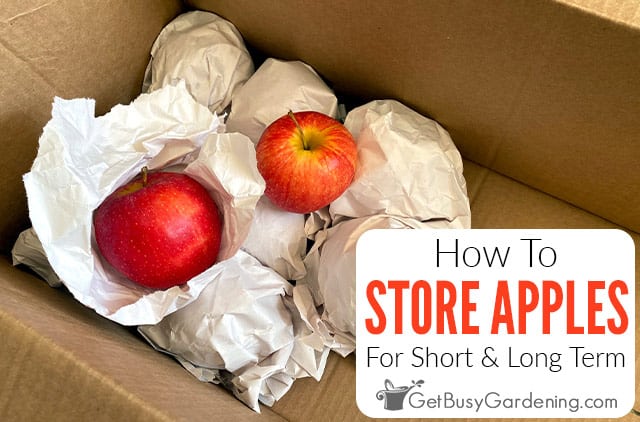
Apples are a staple of fall, and they’re excellent for all of those warm, cozy, and festive recipes.
But when you run out of ideas (or energy) for using them up, it’s time to learn how to pack and store them so you can continue to enjoy them all winter long.
Below I’ll explain what you need to know about storing apples for short and long term, and why it matters.
Storing Apples In The Fridge Short Term
The refrigerator is the ideal place for storing apples because it is perfectly cold and humid for them.
Place them in the crisper drawer, but away from other produce. This is important because they give off a gas which is harmless to us, but can cause other produce to spoil faster.
Also, for best results, keep them whole. As I’m sure you may already know, cut apples turn brown quickly and don’t store well.
If you put them into the fridge right after picking them, they can last as long as 6 months.
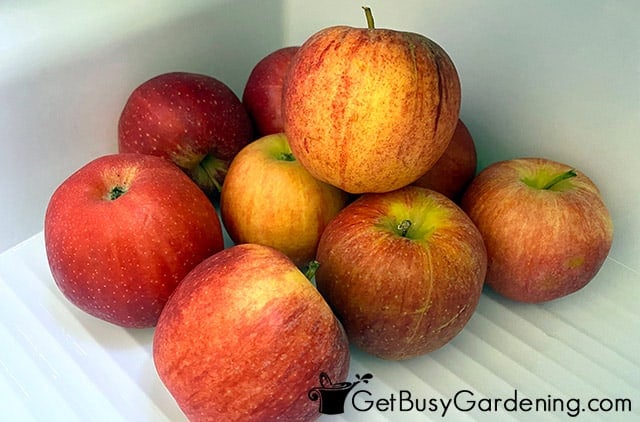
Storing Apples For Longer Term
While the refrigerator is an ideal storage location for apples, most people only have the space to keep them there short-term.
So, below I’ll discuss options for storing them longer, and show you how to do it step by step.
Preparing Apples For Storage
Before we dive into the details for how to store apples, it’s important to consider these first few steps to ensure they will last the longest, and don’t rot or mold.
Pick Them At The Right Time
Perfectly ripe or slightly underripe fruit will last the longest. So harvest them right before they fully ripen on the tree if you can.
Small, immature, or overly-ripe apples do not keep well. Eat or use those up rather than trying to store them.
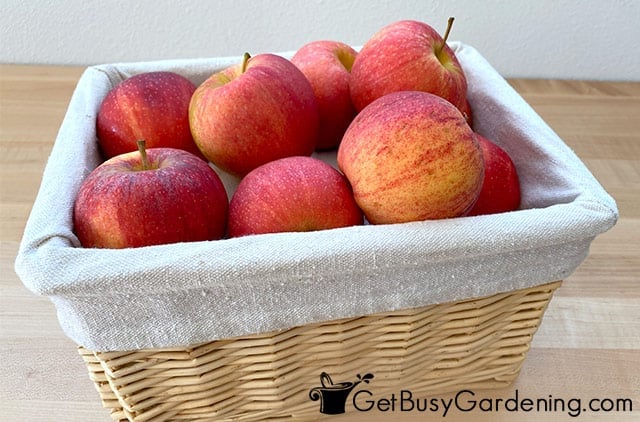
Don’t Let Them Sit Out
The sooner you store your fresh apples, the longer they will last. So don’t leave them sitting out on the counter very long before packing them up.
They can quickly become overripe on the counter, which means they will degrade and rot much faster.
Handle Them With Care
Bruised or damaged apples don’t store well, and will quickly rot or get moldy. So, since they are a very delicate fruit, it’s important to handle them with care at all times.
Never drop or toss them into a pile or bucket while picking them, and be very gentle as you pack them.
Pack Them In The Right Container
I highly recommend using either a cardboard box or a wooden crate for storing apples.
These types of containers are porous enough to allow air circulation, preventing moisture buildup and molding. But they’re also sturdy enough to hold the weight when stacked.
How To Store Apples Long Term
In order to have the best success storing them, it’s important to pack your apples the right way. Below, I’ll walk you through how to do that step by step.
Steps For Packing Apples For Storage
Here are the detailed steps for storing apples so they last as long as possible and still taste delicious! If you have a harvest rack, then you can skip these steps.
Step 1: Inspect them – Inspect each one thoroughly to ensure there are no blemishes, cracks, soft spots, or bruises.
If any are imperfect, put those into the fridge to eat up right away.
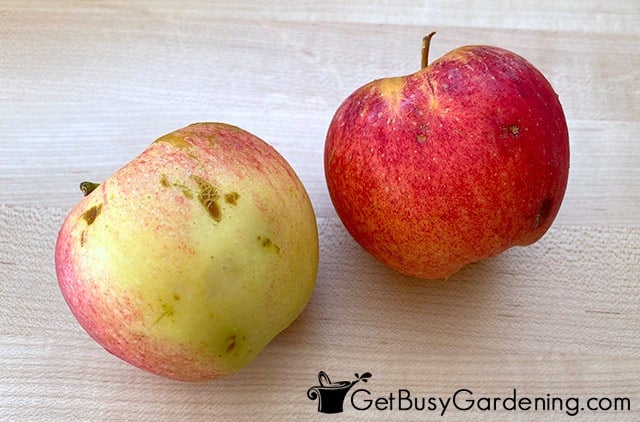
Step 2: Wrap each one individually – It’s important that they aren’t touching each other, because if one goes bad, the others will quickly follow.
So, to keep them from touching, wrap each one in newspaper, a paper towel, or newsprint.
Step 3: Pack them into a cardboard box or crate – Layer them in the box loosely, leaving a bit of space around each one.
Do not try to cram or pack them in tightly, or they may bruise. They also need a little room to breathe in order to stay the freshest.
Step 4: Place the box on a shelf – I prefer to store my apples on a shelf, rather than on the floor, to ensure the boxes stay dry.
But you could just stack them in a corner somewhere, if excess moisture is not a concern.
Step 5: Check on them regularly – Open the boxes at least once a month to make sure none of the fruits are showing signs of rot or mold.
Be sure to immediately remove any that are, or they can quickly spoil the whole bunch.
Where To Store Apples
The best place to store apples for the long term is in a dark, cool, and humid location.
An unfinished room in your basement, a cellar, cool pantry, or unheated garage would all be great choices, as long as it never drops below freezing.
Here are some tips to help you find the perfect spot in your home.
Find The Ideal Temperature
Apples hate the heat. If they’re kept too warm in storage they will degrade much faster.
So make sure to keep them in the coolest room that you can. The ideal temperature is 32-35 F, or just above freezing.
Maintain High Humidity
If it’s too dry, they will shrivel up, so try to find a humid spot for them. But don’t put them in a place where it’s wet, because mold won’t be far behind.
The ideal humidity level is 90-95 percent, and you can easily keep track of it using an indoor monitor.
For dry locations, you can open the boxes and lightly mist water over the top of the newspaper every so often to help increase humidity.
Keep Them Away From Other Produce
You should never store your apples next to any other type of produce, or it could spoil.
That’s because they give off an otherwise harmless gas that can speed up the ripening and decay process of nearby produce.
It’s especially important to keep them away from potatoes, which give off a gas of their own that can spoil your apples. Keep them as far away from each other as you can.
How Long Do Apples Last In Storage?
With proper packaging and storage, most apples will last anywhere from 3-6 months. The exact amount of time depends on the variety you have.
Thicker skinned, tart varieties, like Fuji, Granny Smith, and Braeburn, can last as long as 6 months to a year in storage.
But the thinner skinned, sweeter ones, like Golden Delicious, Honeycrisp, and Gala, usually only last 3-5 months. So eat those up first.
FAQs About Storing Apples
Below I’ll answer some of the most frequently asked questions about storing apples. If yours isn’t answered here, ask it in the comments section below.
Do apples last longer in the fridge or on the counter?
Apples last much longer in the fridge than they do on the counter. That’s because warm temperatures cause them to over-ripen and degrade much faster.
Do apples need to be refrigerated?
No, apples do not need to be refrigerated. However, if you want them to last longer outside of the fridge, then you should keep them in as cool of a location as possible.
Can apples be stored for a year?
Some types of apples can be stored for a year, as long as they are kept in the ideal conditions. In warmer locations, they’ll go bad faster.
What is the best way to store apples for winter?
The best way to store apples for winter is to either keep them in the fridge, or pack them into a box and put it in a cool, dark, and humid location.
What is the best temperature to store apples?
The best temperature to store apples is 32-35F, or consistently hovering just above freezing.
Storing apples for short and long term use is actually very easy. Doing it correctly will help ensure that they stay fresh as long as possible.
More About Preserving Food
- How To Preserve & Store Peppers Long Term
- Freezing Corn On Or Off The Cob
- Freezing Carrots With Or Without Blanching
More About Apples
- How To Preserve Apples For Long Term
- How To Dehydrate Apples: 5 Simple Drying Methods
- How To Can Apples
- How To Can Apple Butter (With Recipe!)
- Easy Healthy Apple Muffins Recipe
Share your tips for how to store apples in the comments section below.
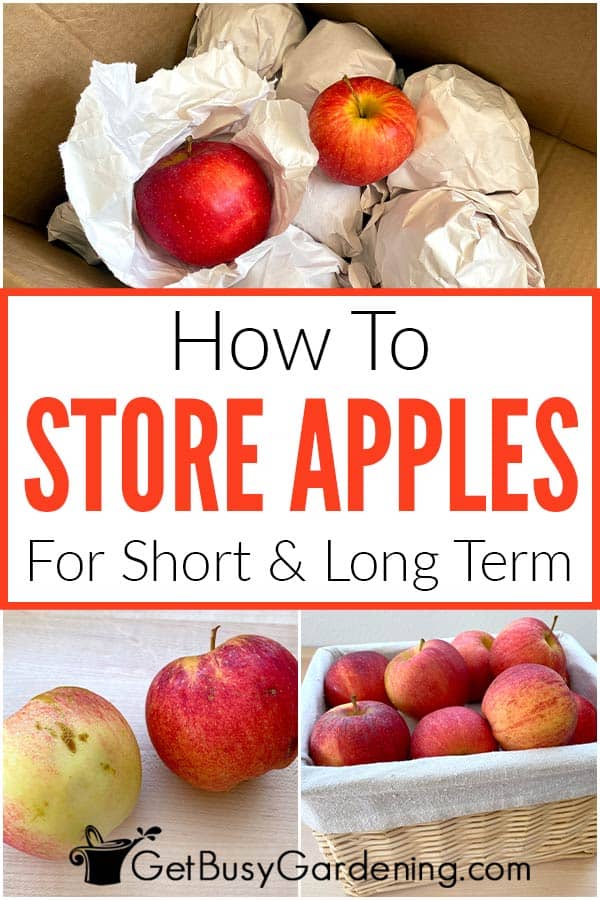
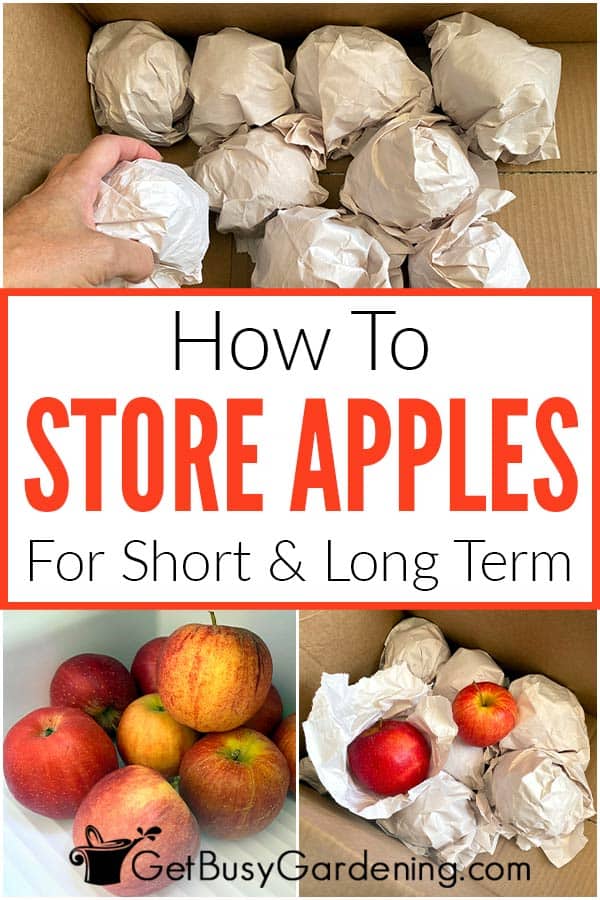
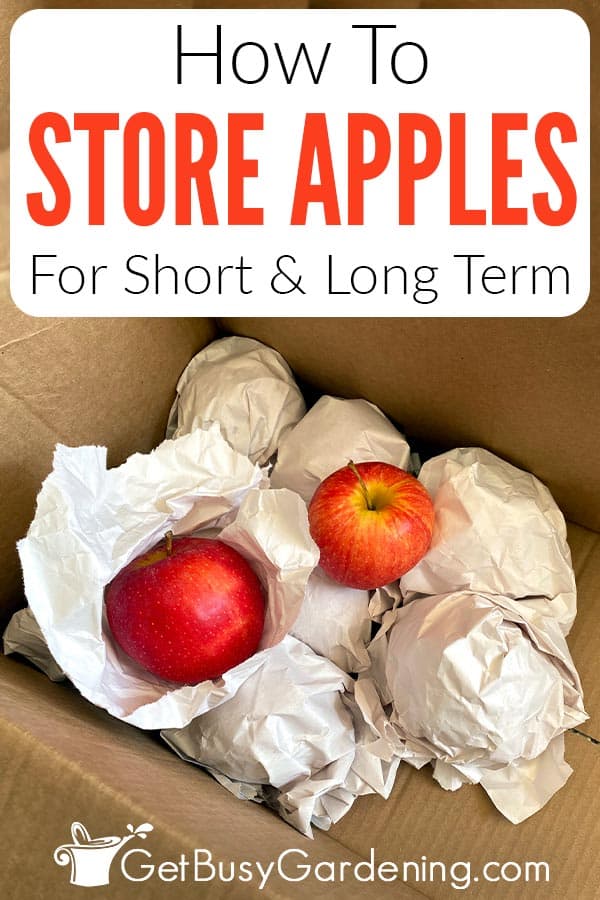

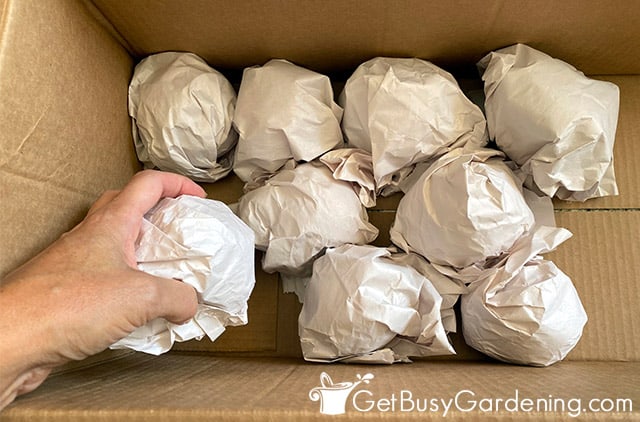
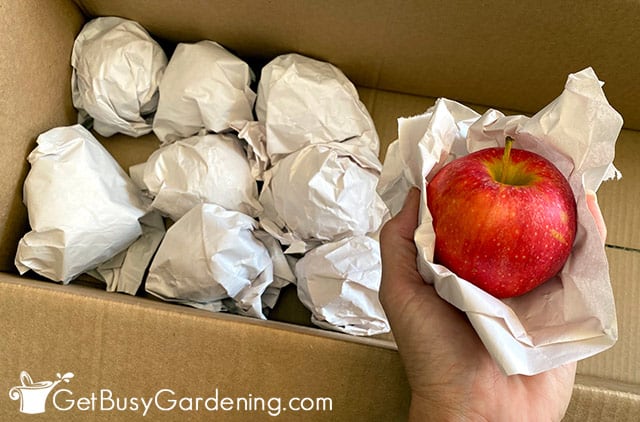
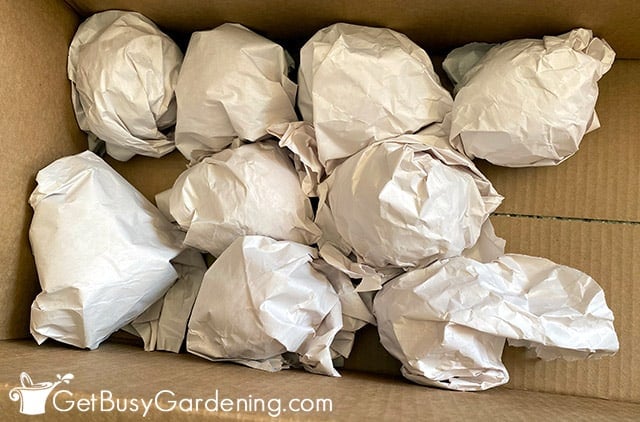

Bianca K Haffner says
Do you have to wash them first in vinegar or anything?
Amy Andrychowicz says
I don’t recommend washing your apples before storing them, wait until you’re ready to eat them.